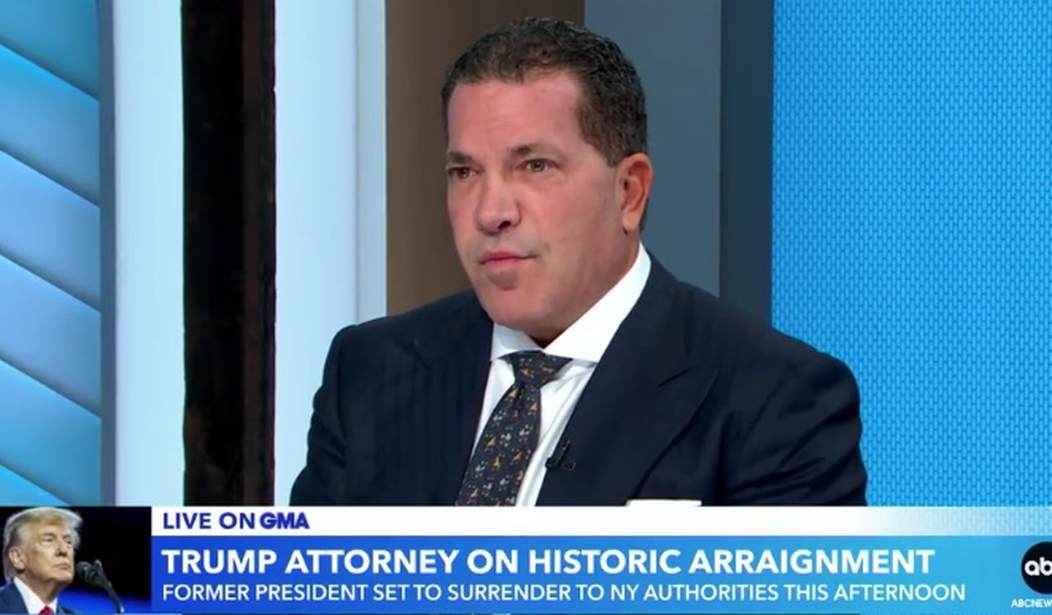What happens today when prosecutors book a former American president for the first time in our history? Nothing remarkable, Joe Tacopina told ABC News’ George Stephanopoulos this morning. Donald Trump will get “processed the way anyone else would be, to a degree,” Trump’s lead attorney says, with the degree being that most defendants don’t have a Secret Service protection detail.
Stephanopoulos wonders whether Trump might plead down to a misdemeanor to get this off his plate. Not a chance, Tacopina says, and doubts whether this case will even survive long enough for such discussions:
“Really, there’s a lot of mystery here because we’re doing something that’s never been done before,” Tacopina told ABC News’ George Stephanopoulos in an interview on “Good Morning America.”
“One thing I can assure you as I sit here today is there will be no guilty plea in this case,” he added. “That is one thing I can guarantee you.”
Tacopina said Trump won’t be put in handcuffs but “he’ll be processed the way anyone else would be, to a degree — again, with Secret Service involvement.”
Today’s processing won’t take more than 30 minutes, Tacopina predicts. He doesn’t think the case itself will last much longer, relatively speaking:
Trump’s defense team plans to make “a lot of motions” once they see the indictment, according to Tacopina.
“I don’t think this case is going to see a jury. I think it’s going to go away on papers,” he said. “I think there’s a legal challenge that will be made and should be made successfully.”
There may be multiple challenges to this case, and Tacopina mentions a couple of them in this interview. First is a generic motion to dismiss, which is itself not an argument but a vehicle for challenges to the indictment. Tacopina specifically mentions selective prosecution, an accusation that will likely involve the lack of action by the Manhattan DA to Hillary Clinton’s funding of the Steele dossier. Clinton and her team finally agreed to pay a fine of $113,000 almost exactly a year ago for hiding the payment as a legal expense in a case that began in 2018 … and in which the Manhattan DA’s office took no interest:
Hillary Clinton’s 2016 presidential campaign and the Democratic National Committee have agreed to pay $113,000 to settle a Federal Election Commission investigation into whether they violated campaign finance law by misreporting spending on research that eventually became the infamous Steele dossier.
That is according to documents sent on Tuesday to the Coolidge Reagan Foundation, which had filed an administrative complaint in 2018 accusing the Democrats of misreporting payments made to a law firm during the 2016 campaign to obscure the spending.
The Clinton campaign hired Perkins Coie, which then hired Fusion GPS, a research and intelligence firm, to conduct opposition research on Republican candidate Donald Trump’s ties to Russia. But on FEC forms, the Clinton campaign classified the spending as legal services.
“By intentionally obscuring their payments through Perkins Coie and failing to publicly disclose the true purpose of those payments” the campaign and DNC “were able to avoid publicly reporting on their statutorily required FEC disclosure forms the fact that they were paying Fusion GPS to perform opposition research on Trump with the intent of influencing the outcome of the 2016 presidential election,” the initial complaint had read.
Clinton’s campaign headquarters was in Brooklyn, not Manhattan. [See below.] Furthermore, the FEC fine is a civil penalty, which means that double jeopardy doesn’t apply. So why hasn’t Bragg called a grand jury to investigate Clinton’s fraud?
This brings up two other potential challenges. First, Tacopina and his team are likely to argue that this should also have been handled as a civil complaint rather than a criminal complaint. Presumably, business-record ‘fraud’ would normally fall into this category when no other harm took place, especially when prosecuting it after the criminal statute of limitation had run out. More to the point, however — and Tacopina mentions this specifically — this issue falls under federal jurisdiction in terms of presidential campaigns, just as the Clinton-Steele dossier matter did.
Finally, if this goes far enough, Tacopina will likely move to disqualify Bragg’s office and the grand jury result on a charge of political bias and violations of due process. Two former prosecutors wrote a book discussing this case when Bragg initially declined to present it to the grand jury, a move explicitly intended to put political pressure on Bragg to reverse his decision. Tacopina and his team are likely to argue at that point that the process has become so politically corrupt that Trump is being persecuted for his politics rather than any alleged criminal activity. That may not convince the first judge, but that may be an argument for instant appeal.
And bear in mind, none of these arguments are mutually exclusive. Tacopina can and likely will combine these arguments into a formidably broad offensive against Bragg and his shaky logic and questionable legal theories.
Today is just the beginning, but it may not be too far from the end.
Update/correction: I originally wrote that Brooklyn was in Bragg’s jurisdiction as New York County District Attorney, but that is incorrect. Brooklyn is Kings County, which has its own DA. That could complicate a selective-prosecution argument, even if it doesn’t moot it altogether. Thanks to VIP member Ira for the correction, and I have edited the passage above.








Join the conversation as a VIP Member